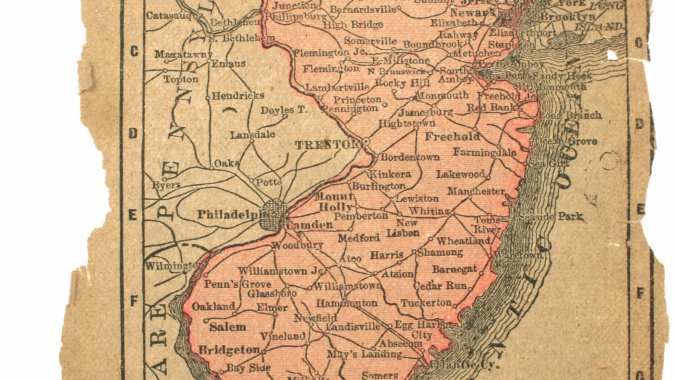New Jersey: Third of the Original Thirteen to Join the United States
LISTEN ON SOUNDCLOUD:
3 – New Jersey – December 18, 1787
Third of the thirteen original states to ratify the U.S. Constitution and join the United States,
“The Garden State” of New Jersey entered the United States December 18, 1787. The New Jersey State Constitution in use today was adopted in 1947 (effective January 1, 1948) and has been amended several times since in minor ways, but its first constitution, written during the crisis of the Revolutionary War, was adopted on July 2, 1776.
Constitutional Convention
New Jersey sent five delegates to the Constitutional Convention in Philadelphia- David Brearley, Jonathan Dayton, William Livingston, William Patterson, and William Houston. Only the first four signed the Constitution in September 1787, as Houston missed most of the Convention due to illness. Livingston was the first Governor of New Jersey, holding the position from 1776 until his death in 1790. His duties in that capacity limited his participation in the Convention, but he was Chair of the Committee of Slave Trade, which developed the compromise on the slavery issue. Livingston also was an active supporter of New Jersey’s quick ratification of the Constitution. Brearley’s main contribution appears to be helpful in developing the Electoral College as part of the Committee of Leftovers, Dayton’s appears to have been minimal, although he participated occasionally in debates, and Patterson introduced the New Jersey Plan, which protected the smaller states against the larger ones. The New Jersey Plan proposal contemplated a unicameral legislature, as the Articles of Confederation contained, with equal voting for each state. It also would have had the national legislature select the executive. Although the New Jersey Plan did not prevail, its concept of protecting smaller states was reflected in the Senate provisions. Patterson would become an Associate Justice of the Supreme Court of the United States in 1793, a position he held until his death in 1806.
The New Jersey Ratifying Convention met in Trenton from December 11 through 20, 1787, and ratified the Constitution on December 18, 38-0, becoming the third state to do so. Not much appeared to have been debated during the days the New Jersey Ratification Convention met, as the new federal Constitution addressed the major concerns and needs of the state. In addition, it appears only Federalist delegates were selected to attend the New Jersey Convention. New Jersey also had a very large debt and heavy levies would have been required, so that too provided motivation for New Jersey to ratify the U.S. Constitution.
New Jersey became the first state to ratify the Bill of Rights when they were submitted, approving eleven of the twelve proposed. Like Delaware, New Jersey in 1787 was a smaller state and with the protections of smaller states incorporated into the final Constitution, with a strong national government, New Jersey delegates were satisfied.
The New Jersey Constitution
Immediately before the approval of the Declaration of Independence, the New Jersey delegates met in haste to consider a state constitution to address the emergency and likely imminent invasion by British forces. Written as a temporary document to address the urgency of the state, it remained in place until 1844. The constitution allowed all inhabitants worth at least fifty pounds the right to vote, and contained a number of different provisions, including maintenance of the common law and a prohibition on deodand (forfeiture of objects that caused someone’s death). It also included a free exercise of religion and an establishment clause.
On June 29, 1844, New Jersey adopted its second constitution, which limited suffrage to white males and separated the government into three branches. The 1844 constitution was one of the first to include a debt ceiling concept in it. The 1844 constitution was amended in 1875 to conform it to the Fourteenth and Fifteenth Amendments to the United States Constitution.
The current constitution became effective in 1947 and is similar to many state constitutions, although it also contains specific provisions addressing casinos and their regulation. The current version also includes a provision that terms such as “person” refer to both sexes.
Conclusion
Like Delaware, had New Jersey for some reason not ratified the Constitution, there would still have been a United States. Little did the four signers of the Constitution from New Jersey in 1787 foresee that their relatively small state would be the 11th most populous in present times. New Jersey’s delegates were instrumental in protecting the smaller states and although the Virginia Plan ultimately was the winner in the final Constitution, the New Jersey Plan protections were incorporated. The Garden State, along with Delaware and Georgia, were the only three of the thirteen colonies to vote unanimously at their state conventions for ratification of this new union, the United States of America.
Dan Cotter is a partner at Latimer LeVay Fyock LLC and an adjunct professor at The John Marshall Law School, where he teaches SCOTUS Judicial Biographies. His book, “The Chief Justices,” (April 2019, Twelve Tables Press), is available now. He is also a past president of The Chicago Bar Association. The article contains his opinions and is not to be attributed to anyone else.
Click Here for the next essay.
Click Here for the previous essay.
Click Here to have the NEWEST essay in this study emailed to your inbox every day!
Click Here to view the schedule of topics in our 90 Day Study on Congress.




As a person who has lived in several small states I have appreciated the impact of the New Jersey plan.
PSD